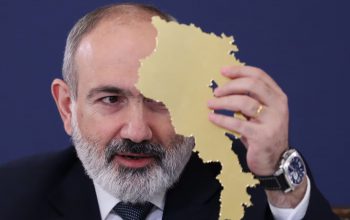On Friday, Azerbaijan assumed control of most of the border areas that the Armenian government had agreed to cede under last month’s controversial border deal, which has ignited antigovernment protests in Armenia.
Azerbaijani Deputy Prime Minister Shahin Mustafayev, who negotiated the April 19 deal with his Armenian counterpart Mher Grigorian, announced that Azerbaijani border guards took positions there in the morning. Mustafayev stated that Azerbaijan regained a total of 6.5 square kilometers of territory, encompassing four Azerbaijani villages captured by Armenian forces in 1991-1992.
Previously, the Azerbaijani army had occupied large swathes of land belonging to several villages in Armenia’s Tavush province. Under the agreement, it will retain this land in exchange for the Armenian territorial concessions.
Armenia’s National Security Service (NSS) confirmed the first land transfer, which Azerbaijani President Ilham Aliyev hailed as “yet another victory” for his country. The NSS indicated that another, more sensitive border area will be handed over to Baku by July 24.
This area includes Kirants, one of the four Tavush villages impacted by the Armenian withdrawal. Kirants will lose significant agricultural land, several houses, and a bridge connecting it to the rest of Armenia.
Local residents argue that the land transfer will place their community dangerously close to new Azerbaijani border posts, prompting protests late last month and early this month to prevent it.
On May 2, security forces cleared a protest camp in Kirants to allow Armenian authorities to proceed with preparations for the handover. On May 19, they again blocked all roads leading to the village, which has remained cordoned off since then.
Protest leader Archbishop Bagrat Galstanyan and his supporters took their campaign against the “illegal” handover to Yerevan on May 9, holding rallies to demand Prime Minister Nikol Pashinyan’s resignation. Galstanyan’s movement, supported by various Armenian opposition groups, plans another rally in the capital on Sunday.
Pashinyan has argued that the unilateral concessions are necessary to prevent Azerbaijani military aggression against Armenia. He reiterated this stance in a televised address to the nation on Friday evening.
“If our strategic vision is not realized, the already difficult peace will not be possible because our environment will consider us a strategic threat,” he said.
Critics of Pashinyan argue that, on the contrary, he is encouraging Baku to demand more territory from Armenia and use force to achieve its aims.




